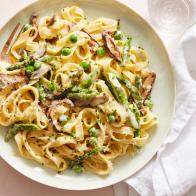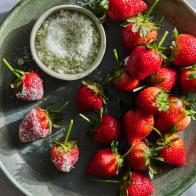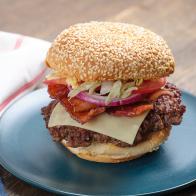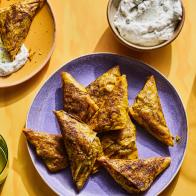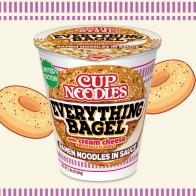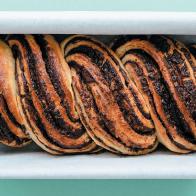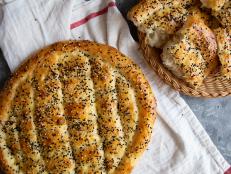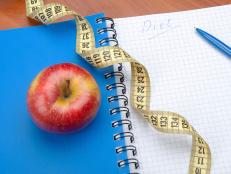What to Eat (and Avoid) During Ramadan
We rounded up tips from Muslim home cooks, recipe developers and food bloggers for more seamless fasting.

Jasmin Merdan / Getty
What Is Ramadan?
Ramadan is one of the most important religious observances in the Muslim calendar. It is a month-long period of spiritual reflection and self-sacrifice culminating in a joyous celebration called Eid ul Fitr. Although it is a time of abstinence for the world’s Muslims, many approach the holiday with a sense of joy as the shared experience of fasting brings people together.
Ramadan Rules
From dawn to dusk during this holy time, Muslims are obligated to abstain from ingesting anything. This includes food, water and tobacco smoke.
During this fasting period, Muslims are expected to spend time reading and contemplating the Qur’an, the Islamic holy book, and performing good deeds.
Fasting exceptions are made for those who are ill and pregnant, as well as the elderly and young children. Ramadan isn’t a time to risk one’s health. Rahaf Al Bochi, RDN, LD, Media Spokesperson for the Academy of Nutrition and Dietetics and owner of Olive Tree Nutrition LLC reminds us: “if fasting poses harm, then remember that there are exemptions from fasting, including for those with chronic diseases for whom fasting would pose harm to their health.” She has a detailed guide for those with diabetes who plan to fast during Ramadan, which you can check out here.
Iftar Meaning
The highlight of Ramadan is when Muslims break their fasts over an evening meal called iftar. A full day of fasting encourages many Muslims to better appreciate what they have. As well, the iftar meal is a time for sharing and community. In many communities, strangers will be invited into homes so that they won’t break their fast alone. Many organizations also provide free iftar meals to anyone, regardless of religion, during this time.
For iftar, it is traditional to break one’s fast with some dates and a drink of milk or water. Many Muslims around the world do this, but it isn’t a religious requirement. Al Bochi relates that “it’s very important to break your fast immediately at iftar time,” which coincides with sunset. There are apps and other resources that alert you to when you can break your fast, so you don’t have to keep your eyes on the horizon waiting for the sun to set.
To rehydrate, especially when Ramadan occurs during the summer, many people feature fresh, juicy fruits and salads to replenish their fluids. Many families use iftar as an opportunity to feast and may put on a lavish spread of rich foods to make up for the long daily fasts. However, too much rich food after a day of no food may cause some digestive issues.
Al Bochi can’t stress enough the importance of having balanced meals for iftar, as well as suhoor. “A great visual is the healthy plate model, which is half your plate for vegetables, a quarter of your plate for protein and a quarter of your plate for fiber-rich carbs,” she says
Suhoor Meaning
There is another Ramadan meal that is equally important called suhoor. In some parts of the world, this is also called sehri. This is the pre-dawn meal that is supposed to sustain fasters for the 13 to 17 hours they will need to fast. As Owais Siddiqui, a halal baker and caterer in Long Island, New York, points out, “suhoor is a meal that isn’t something people necessarily look forward to, as it entails getting up way early [before dawn] and preparing meals,” but it is “arguably the most important meal of the day.”
Al Bochi echoes this sentiment, advising that “waking up for suhoor is important to prepare you for the day’s fast. Skipping this meal can place your body in ‘starvation mode,’ which may result in muscle breakdown and extreme fatigue.”
Carbohydrates are very popular suhoor items, and many North American Muslims will use this pre-dawn meal to indulge in some American breakfast staples. However, Siddqui, who studied medicine in his native Pakistan, advises to take your own blood glucose levels into account. Fasting can have serious effects on your blood glucose levels.
Tips On Fasting for Ramadan
Ramadan eating habits don’t reflect how Muslims – or anyone else, for that matter – normally eat. As such, it takes a little planning and preparedness to have a stress-free and healthy Ramadan. Parents, grandparents, uncles and aunties have many traditional tips and specific foods they recommend, but as Siddiqui explains, “Meals over time and places are constantly evolving to suit the lifestyle and needs of people observing the fast in the holy month.” Many contemporary Muslims living in North America have thus incorporated some diverse hacks for a struggle-free fast.
Al Bochi stresses that everyone who is fasting during Ramadan should “hydrate well during non-fasting hours with water and non-sweetened beverages.” Siddiqui suggests avoiding caffeine for suhoor unless you really need it to start your day. Caffeine, which is found in coffee and tea, can make you dehydrated, and since you can’t have anything to drink until dusk, that is something to be conscientious about.
Siddiqui has a handy checklist for making sure you focus on your health during Ramadan. Some of his tips include the following:
- Hydrate before eating and limit consumption of beverages that contain high amounts of sugar.
- Consume nutrient-rich foods that also maintain adequate hydration, like smoothies and soups.
- Eat plenty of greens and foods rich in fiber.
- Opt for wholesome complex carbs for suhoor, like quinoa, bulgur, farro, brown rice and whole grain breads.
- Consume healthy lean proteins, including lentils, beans and nuts.
- Pace yourself. Slowly eating smaller portions may be better for your overall health.
- Avoid food high in fats, sugars and sodium. Instead of frying, try baking, steaming, grilling, stewing and roasting.
- Engage in a mild exercise routine.
Shadi HansazadeNemati, the recipe developer and writer behind the blog Unicorns in the Kitchen, also observes Ramadan. She wrote an amazing and thorough guide to having a stress-free Ramadan during a pandemic, which you can read here. She broke the basics down for us:
“I’d say avoid salty stuff because you’ll get thirsty. Oatmeal is so good for suhoor because it keeps you full. Chia pudding also, because you’ll be hydrated. Natural sweets like honey and date are so much better [than sugar]. Something light like soup for iftar. Make sure to have some greens and salads. Also, make sure you have some protein, too.”
Sheala Khan, a home cook in Illinois, goes a step further, suggesting that you need to have the right mindset when fasting and eating during Ramadan:
“The main tip I can offer is to listen to your body and be ready for trial and error. It’s taken me years to learn and understand that I’m not someone who can have certain things for suhoor (because of acid reflux, etc. that show up hours later) so I’ve had to listen to my body and accept that most online tips won’t suit most people.”
Al Bochi concurs, adding, “I always recommend listening to your body’s fullness cues. Practice mindful eating at iftar and suhoor to help you listen to your body’s fullness and allow you to enjoy your food. This means slowing down when eating, chewing foods well, putting away distractions and pausing halfway through your meal.”
Related Content:
